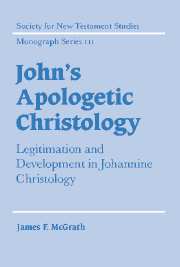Book contents
- Frontmatter
- Contents
- Preface
- Part 1 Introduction
- Part 2 Jesus and God
- 3 Are there ‘two powers’ in John?
- 4 God's equal or God's agent? (John 5)
- 5 ‘I obey, therefore “I am”’ (John 8.12 – 59)
- 6 ‘You are gods’ – but who are ‘you’? (John 10.22 – 39)
- 7 In the bosom of the Father (John 1.1 – 18)
- 8 Conclusion to part 2
- Part 3 Jesus, Moses and Torah
- Part 4 Other issues and conclusion
- 16 Conclusion
- Bibliography
- Index of biblical references
- Index of authors
- Index of subjects
4 - God's equal or God's agent? (John 5)
Published online by Cambridge University Press: 22 September 2009
- Frontmatter
- Contents
- Preface
- Part 1 Introduction
- Part 2 Jesus and God
- 3 Are there ‘two powers’ in John?
- 4 God's equal or God's agent? (John 5)
- 5 ‘I obey, therefore “I am”’ (John 8.12 – 59)
- 6 ‘You are gods’ – but who are ‘you’? (John 10.22 – 39)
- 7 In the bosom of the Father (John 1.1 – 18)
- 8 Conclusion to part 2
- Part 3 Jesus, Moses and Torah
- Part 4 Other issues and conclusion
- 16 Conclusion
- Bibliography
- Index of biblical references
- Index of authors
- Index of subjects
Summary
John chapter 5 provides a natural starting point for an examination of Johannine Christology in relation to legitimation, as in this chapter one finds numerous indications both of some of the points at issue in the christological controversy, and of the ways the Fourth Evangelist sought to respond to them. Under the guise of ‘the Jews’, the contemporary opponents of the Johannine Christians are allowed to raise their objections. As Loader points out, the accusations brought in this chapter ‘are doubtless … real accusations hurled at the Johannine community by Jewish critics’. The Johannine Jesus then provides a response to these Jewish objections, a defence or legitimation of Christology. These features have led a number of scholars to see an apologetic thrust here: the beliefs of the community are being ‘put on trial’ by Jewish objectors, and what is being mounted here is a defence of their understanding of Jesus, which is coupled with a denunciation of their opponents' unbelief (5.37–47). There is much to support the conclusion that the whole passage (John 5.19–47) represents one of the clearest examples in John of the Evangelist engaging in legitimation, in the defence of his community's beliefs about Jesus.
The subject of the conflict
In order to ascertain exactly what is at issue in the conflict with ‘the Jews’ in John 5, we must consider the relationship between earlier tradition and the miracle story which John recounts in this chapter.
- Type
- Chapter
- Information
- John's Apologetic ChristologyLegitimation and Development in Johannine Christology, pp. 80 - 102Publisher: Cambridge University PressPrint publication year: 2001



